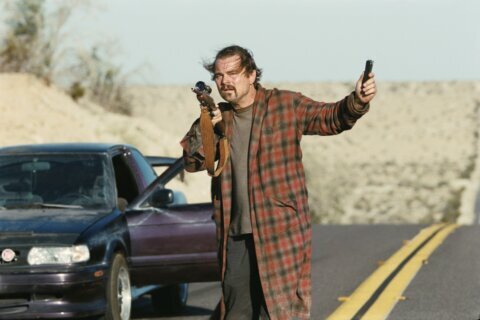Most moviegoers don’t immediately associate westerns and journalism under the same genre — “Red River” (1948) seems to be a polar opposite of “All the President’s Men” (1976) — but the two actually have a long history of going hand in hand on the frontier.
John Ford’s “The Man Who Shot Liberty Valance” (1962) taught us, “When the legend becomes fact, print the legend,” while Clint Eastwood’s “Unforgiven” (1992) saw a giddy journalist documenting the final shootout between William Munny and Little Bill Daggett.
Now, the two collide again in Paul Greengrass’ “News of the World,” which opened in limited theaters on Christmas Day and hits video-on-demand on Friday for $19.99.
Based on Paulette Jiles’ 2016 novel, the story is set in 1870s Texas, where Civil War veteran Captain Kidd (Tom Hanks) travels from town to town reading newspapers to local citizens. His life changes when he meets Johanna (Helena Zengel), who was kidnapped and raised by the Kiowa tribe. It’s his job to deliver her back to her aunt and uncle.
After playing Ben Bradlee in “The Post” (2017), Hanks is no stranger to newspapermen, but it is hard to believe that this is his first western. Hanks reunites with Greengrass after “Captain Phillips” (2013), ironically still called “captain.” It’s a meaty role portraying a traveling entrepreneur turned lonely drifter missing the wife he left back in San Antonio.
His journey is a father figure arc that works thanks to the exceptional German child actress Zengel, who recalls Michael Apted’s “Nell” (1994) when she first appears in the wilderness. Though there are fun “teaching” moments as she first tastes sugar, Johanna isn’t reduced to a savage but rather a tough girl, twice orphaned, wise beyond her years.
Adapted by Luke Davies (“Lion”), the plot is derivative of other father-figure westerns such as “Ride the High Country” (1962) or “True Grit” (1969), but the language barrier makes it a fresh take on an old idea. Not only do they learn each other’s dialects, they teach each other life lessons, as she says, “To move forward, you must first remember.”
Don’t worry, viewers still get plenty of action, with a series of rugged obstacles from sandstorms to horse chases. Greengrass delivers plenty of tracking shots of hooves galloping like “Stagecoach” (1939), but his best action sequence comes on foot with a thrilling mountain shootout like “High Sierra” (1941), surviving with ammo ingenuity.
His directorial prowess shines in slower moments, such as a painterly shot gazing out of the window of Johanna’s ransacked home, its shadowy interior forming a frame within a frame. It’s a loving homage to Ford’s “The Searchers” (1956) in both composition and theme, with a dash of Jacob Tremblay surveying his old living space in “Room” (2015).
Beyond the themes of family and loss, the film is most concerned with its journalistic core. As Hanks reads the news to Texans five years after the Civil War, the Southerners would rather hear about the local railroad than federal amendments passed up North. Hanks’ ability to communicate and convert hearts and minds is the movie’s real magic.
Thus, the best scene comes when Hanks scraps a biased local rag to instead share a Pennsylvania article about coal miners. The folks relate to the blue-collar story, proving that class trumps region, but Hanks reads it subversively like the staging of “Uncle Tom’s Cabin” in “The King and I” (1956), agitating the mayor just like it agitated Yul Brynner.
It’s a vital message after a decade of “fake news” and “alternative facts,” as cable news “birther” conspiracies in 2011 lit a fuse that exploded into “stop the steal” violence at the U.S. Capitol in 2021. In this light, “News of the World” shines like a North star over a western landscape, newsprint padding the saddle, hooves galloping toward the truth.









